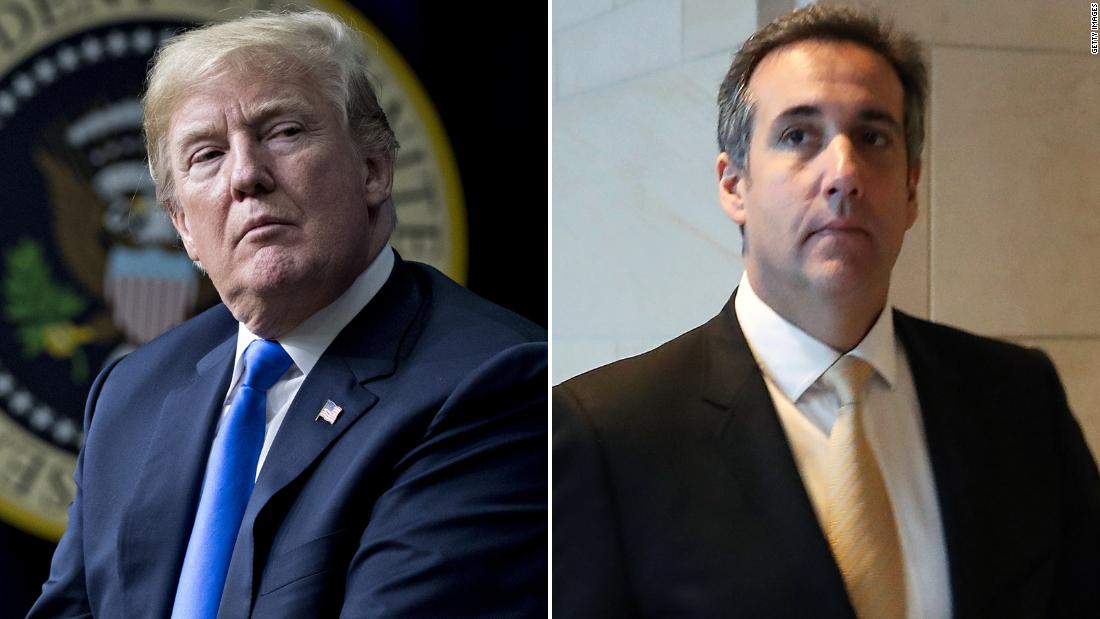[ad_1]
“Inconceivable that the government would break into a lawyer’s office (early in the morning) – almost unheard of,” Trump wrote on Twitter Saturday morning. “Even more inconceivable that a lawyer would tape a client – totally unheard of & perhaps illegal. The good news is that your favorite President did nothing wrong!”
The recording about the former Playboy model, Karen McDougal, which occurred prior to the election, was among the troves of documents and materials that the FBI seized from Cohen’s office, home and hotel in New York back in April amid a criminal investigation of Cohen by the US attorney’s office for the Southern District of New York. Although Trump charged in his tweet that the FBI broke into Cohen’s office, the agency was executing court-approved warrants in conducting the searches.
Despite the President’s comment Saturday, he has waived privilege on the recording, said two sources briefed on legal discussions surrounding the materials seized in April. The recording had been deemed privileged by a former federal judge, known as a special master, one of the sources said, adding that Trump’s lawyers asked the special master to withdraw the privilege. This gives the government access to the recording as part of the US attorney for the Southern District of New York investigation into Cohen.
Trump’s personal lawyer Rudy Giuliani told CNN that Trump had no idea he was being recorded during his conversation with Cohen, which took place in the then-candidate’s office at Trump Tower in September 2016.
McDougal signed a contract with American Media Inc., the company that owns the National Enquirer, which barred her from publicly speaking about the alleged affair before the 2016 election. Trump has denied having an affair with McDougal.
On the recording, Cohen and Trump discuss buying the rights to that contract from AMI, according to Giuliani, who described the contract as a “nondisclosure agreement.” The discussion, Giuliani said, involved their intention “to reimburse AMI for what they laid out and to do it by check, properly recorded.”
A source familiar with the tape said Cohen recommends buying the rights to the story, and Trump asks questions about how they would go about doing that. The discussed payment to AMI ultimately never happened, according to Giuliani.
A spokeswoman for the US attorney’s office and Cohen declined to comment. Cohen’s attorney, Lanny Davis, told CNN in a statement the recording will not hurt Cohen.
“Obviously, there is an ongoing investigation and we are sensitive to that,” Davis said. “But, suffice it so say, that when the recording that has been widely reported is heard, it will not hurt Mr. Cohen. And any attempt to spin cannot change what is on the tape.”
On Saturday, Davis questioned on Twitter why Trump appeared upset in his tweet, pointing out that Giuliani had claimed in the press that the recording is not detrimental to the President.
Trump and Giuliani’s strategy is “flawed; just as Trump’s false Twitter statement made against Cohen this morning,” Davis said. “Rudy claims the tape is ‘exculpatory.’ Why so angry?” he wrote, referring to Giuliani’s comments to the New York Times that the taping is “exculpatory evidence.”
When asked about Davis’ tweet, Giuliani told CNN, “How would you feel if your lawyer was recording you without telling you?” He added that Trump’s “tweet is straightforward and correct.”
In recent weeks, documents and other evidence obtained during the April searches have begun to be turned over to the government as the special master, Cohen’s lawyers and lawyers representing Trump and the Trump Organization have moved through the process of determining which of the millions of items are subject to attorney-client privilege. The special master, Barbara Jones, has found the vast majority of the items reviewed to be not privileged, according to court filings, indicating that very little of what Cohen did in recent years qualified as legal work.
Cohen’s recent public remarks have raised suspicions that he could be willing to seek a cooperation agreement with the US attorney’s office that would require him to provide information federal prosecutors could use against other individuals they are examining. It’s not clear, however, whether the US attorney’s office would be willing to grant Cohen such a deal.
New York is a “one-party” consent state, meaning that as long as one participant in the conversation gives permission to record, it is legal.
The ethics committee of the New York City Bar Association issued an opinion in 2003 that a lawyer may tape a conversation without disclosing so “if the lawyer has a reasonable basis for believing that disclosure of the taping would impair pursuit of a generally accepted societal good.”
However, the committee discourages lawyers from routinely recording conversations without disclosing they’re recording, calling it “ethically impermissible” because it includes a “sufficient lack of candor” and “element of trickery.”
CNN’s Dana Bash and Erica Orden contributed to this report.
[ad_2]
Source link

